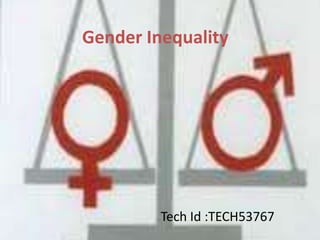Gender inequality
- 1. Gender Inequality Tech Id :TECH53767
- 2. What is gender inequality • The notion that girls should not go out in night. • The notion that they are weak to do certain jobs • Keep telling them about their limitations. -Apart from Rapes, molestation, eveteasing, female feticide, Dowry system.
- 3. The basic problem: • The major problem with gender inequality is that, its eradication is difficult, as the prejudice is integrated at such fine level, and day to day basis, that even if made out, cannot be eradicated properly, within a short period of time.
- 4. Why are women prone to discrimination• Because they are weak, physically. • Because they are not smart and capable to handle themselves and their freedom, safety. • They are not good at IQ. • They have always been meant to compromise, expecting them to become epitome of sacrifice, forcedly. • Because this has been happening over the ages, long back. Really??
- 5. Statistical data 1)Population, total (millions)1,236.69 2012 GNI per capita, Atlas method (current US$)$1,580 2012 Poverty headcount ratio of $1.25 a day (PPP) % of populatioin32.7% 2010 Fertility rate, total (births per woman)2.5 2011
- 6. Statis 2 Share of women employed in the nonagricultural sector (% of total non-agricultural employment)19% 2010 Maternal mortality ratio (modeled estimate, per 100,000 live births)200 2010 Number of weeks of maternity leave12 2009 Proportion of seats held by women in national parliaments (%)11% 2013
- 7. 3 • India ranks 4th most the dangerous place for women. • Ranks 55th in maternal mortality rate, which is mostly due to ignorance towards the pregnant ladies.
- 8. 4 • No of woman per men was recorded, as 962 per 1000 men, in 1901. But after a century, it was recorded as, 933 per 1000 men. • The work participation rate of Indian men, at 51.9% was nearly double the work participation of Indian woman, at 25.7%
- 9. 5 • As a whole, India stands 132 out of 187 countries, in the context of gender inequality, which is still very far from getting a safe country for the development of women.
- 10. *The solution that is already there but is in the darkness due to the lack of awareness and proper implementation • Single girl child scheme : A no. of benefits have been said to be provided to the single girl child, given the lack of awareness, in the grass-root level leaves this policy ignored.
- 11. Different solutions suggested to decrease the bias at social level • Opening all girl schools, in the underdeveloped sub-urban areas, so that the girls go there, even if due to the exclusivity of it. • Awareness at the grass root level. If the mothers would be taught, she will make sure that the girl child, too is given proper education.
- 12. To reduce the crime rate: 1 )A toll free no should be made available, so that when they see the trouble around, they must at-least contact the given helpline, immediately. 2)A women cell should be present in every organization, to avoid the office harassment of the employees.
- 13. 3)Making the police a bit more attentive, and less insensitive towards the victims of gender inequality of any type. 4)The complaints must be registered, without creating any hitches. 5)Strict actions against the lender and the receiver of the dowry.
- 14. 6) Involvement of woman in politics, active participation. 7)Involvement of woman, in police patrolling teams, and training those woman separately, in order to give special attention to victims of bias in any way.
- 15. Reducing it at the intellectual level 1) Family , especially parents should take care that the girl child does not feel excluded in any way 2) Treating mothers, right at the first place is very important to cultivate a sense of dignity and security in the mind of the girl, and retaining a sense of respect in the psyche of the male child. -After all, we learn what we see, and observed, preaching hardly helps.















